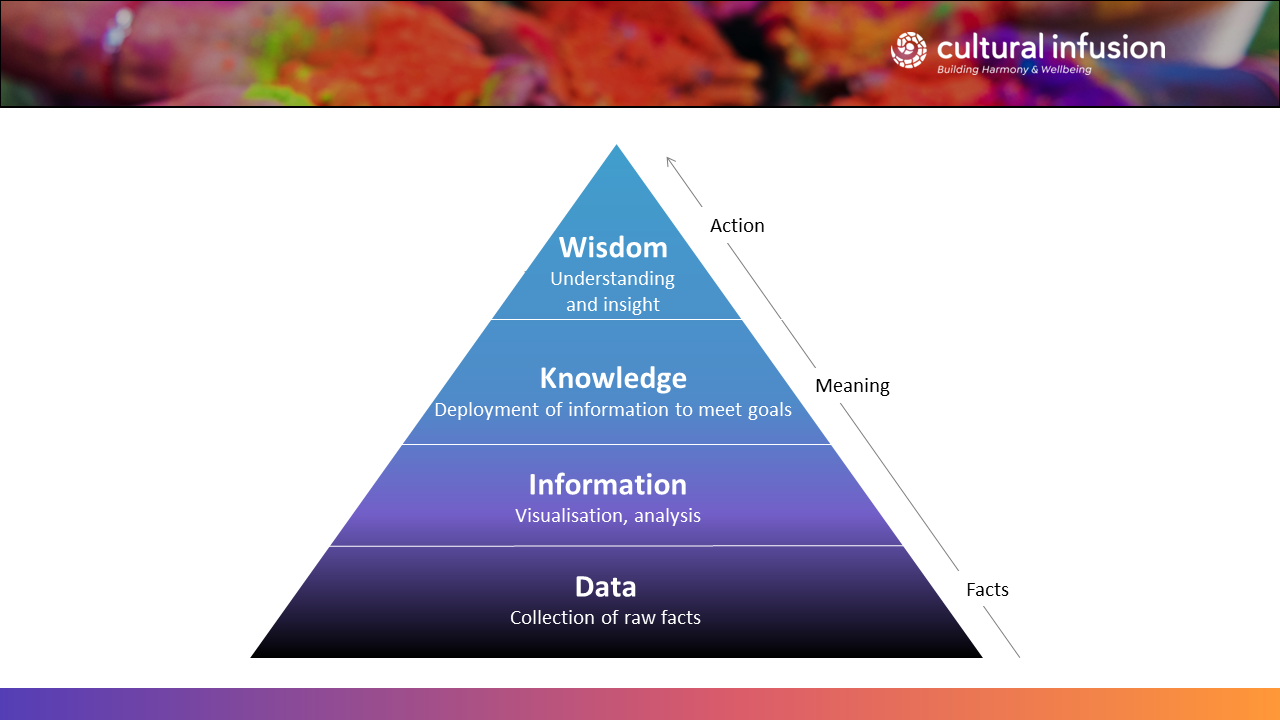
When it comes to data-driven strategies, holistic data are the leading edge. Since it is now within our technological capacity to collect holistic data, leaders in today’s world must stop relying on selective, compromised data, especially in the area of cultural diversity. Selective data perpetuates racism.
I have often written and spoken about why cultural diversity and intercultural competency are increasingly vital for human thriving. Without holistic data, our leaders in the public and private sectors are fumbling their way through our increasingly globalised world, unable to satisfactorily meet the challenges of the moment. But what are holistic data?
What Are Data?
Let’s take a step back to consider what data are.
Data are everything we can quantify. They are a collection of raw facts without meaning. Data only become meaningful once they are sorted into datasets (categories). It is at that point that data convert into information.
Where Do Datasets Come From?
Datasets come from theories about society. For instance, a theory that states there are only two genders has produced many datasets with just two genders. Today, the ‘gender binary’ is challenged by theories that tell us there are more than two human sexes. As a result, an increasing number of organisations that collect data about gender, including our own, allow for more than two options in their surveys.
Most bodies that collect diversity data – I’m thinking of everything from government censuses to Diversity, Equity and Inclusion (DEI) officers – use extremely selective datasets that are often based on outdated categories, the starkest example being the category of ‘race’, which is often touted as a biological fact. I recently spoke about how troubling the reliance on racial categories is among today’s leading AI developers.
Why Is ‘Race’ an Outdated Category?
Race has no credibility, scientific or otherwise. Racism may be real but race is not. When discrimination occurs against a racialised person there are identifiable and measurable characteristics behind that, which could be ethnicity-based, religion-based, appearance and/or even language-based. These outdated datasets create selective (compromised) data.
Newsflash: not everyone categorised as white wants to describe themselves as white.
Compromised data lead to compromised information and people filling in the gaps with assumptions that are often shaped by old, sometimes discriminatory ideas from the past (e.g. racist, sexist and ableist).
We need granular data to discover what is going on. Holistic data.
The Data, Information, Knowledge, Wisdom Model
My educational background is in religious studies and music. I never expected to become a big data guy! But now that I understand the importance of data, I am their biggest fan.
The diagram below (whose original creator is unknown) shows the progression of data to (we hope) wisdom.

What this model reveals is how fundamental data are. Without inclusive data, every subsequent step is compromised.
What Are Holistic Data?
Holistic data are complete data. In the context of human diversity, holistic data are data that have been grouped into highly meaningful categories – categories that reflect the labels that people use to describe themselves.
This is why Diversity Atlas is underpinned by the Global Database of Humanity, datasets which comprise more than 42,000 human attributes, including every known (to our expert researchers) language and dialect, secular and non-secular tradition, ethnic group and country of birth, gender, age, sexual orientation, sex at birth, position level, position type and many other dimensions. The Global Database of Humanity enables Diversity Atlas to collect holistic data, which can inform the correlation between experience and identity like never before.
I have elsewhere quoted mathematician/theoretical biologist Jared Field, who wrote, ‘I am Gomeroi from the Kamilaroi nation. To say so is to perform real magic. Bit by bit the original labelling [being labelled Aboriginal or Indigenous] is dissolved like aspirin in water.’ I have also quoted Kachin woman Mi Kai Lagwi, who in relation to being lumped into the broad category ‘Mainland Southeast Asian’ in the Australian Census said, ‘It makes me feel like we [do] not exist, and it just makes me feel like we are disappeared.’
Paradigm Shift
Many of us have felt dehumanised in some way by a category we’ve been forced into. The ramifications of this are serious.
Holistic datasets are achievable and through the power of technology vast amounts of data can be processed with minimal effort.
A paradigm shift is required to embrace emerging technologies that can move us beyond the prevailing deficit models where we ‘solve’ one side of the Rubik’s cube while neglecting the rest. This is what may finally enable us to see and appreciate each other once more in our constantly shifting relations to each other, beyond any limited concept of identity.
The content in this post focuses on part of the keynote ‘Diversified We Grow: Unlocking Diversity in the Age of AI’ delivered at Big Data & AI World, London, March 2024. For more context, a far-ranging post based on this same keynote can be accessed here.
Share this Post